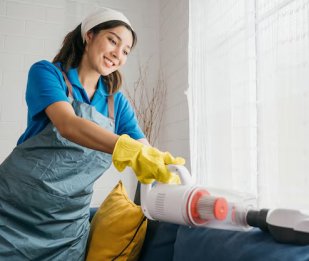While a clean and organized home often reflects harmony, what we don’t always see is the hard work behind that cleanliness. Professional maids play a vital role in maintaining this environment. Their dedication and routine ensure that families can enjoy a hygienic, stress-free home. This blog offers an inside look at the daily routine, challenges, and contributions of professional maids.
The Start of the Day
Most professional maids begin their day early. If they are live-in staff, their work might start at 6:00 or 7:00 AM. If they work hourly or shift-based, they travel across the city to different homes, often starting with their first assignment by 8:00 AM. Their day typically starts with:
-
Reviewing assigned tasks
-
Gathering cleaning supplies
-
Greeting the family politely
-
Receiving instructions or reminders for the day
Maid agencies usually provide daily schedules to help them manage time efficiently across multiple homes.
The Morning Routine: Cleaning and Tidying Up
The first few hours of the maid’s workday usually involve cleaning. This includes:
-
Sweeping and mopping all rooms
-
Dusting furniture, windows, fans, and electronics
-
Cleaning bathrooms thoroughly
-
Organizing beds and laundry baskets
Maids follow a systematic process to clean rooms, often starting from the farthest corner and moving toward the door to avoid stepping over cleaned areas. Professional maids are trained to notice even small details, such as smudges on mirrors or watermarks on taps.
Mid-Morning: Laundry and Kitchen Duties
After general cleaning, the next focus is laundry and kitchen work. For laundry, the tasks include:
-
Sorting clothes by color and fabric
-
Washing clothes either by hand or using a washing machine
-
Hanging clothes out to dry
-
Ironing garments when dry
In the kitchen, depending on the family’s needs, maids might:
-
Wash dishes or load dishwashers
-
Wipe kitchen counters, tiles, and stovetops
-
Clean out the refrigerator or microwave
-
Assist in cutting vegetables or preparing basic meals
Their attention to cleanliness in the kitchen ensures hygienic meal preparation, which is especially important in homes with children or elderly members.
Afternoon Tasks: Specialized Cleaning and Child Care
In some homes, especially in extended duty hours, maids are also responsible for deeper tasks like:
-
Deep cleaning carpets or curtains
-
Polishing furniture
-
Washing windows
-
Cleaning balconies or patios
For households with children, maids may also be asked to:
-
Supervise children during playtime
-
Help with feeding or diaper changing
-
Assist school-age kids with basic homework or organizing school bags
Their support becomes essential in dual-income households where parents are not available during working hours.
Managing Multiple Homes
Part-time maids often handle multiple homes each day. This requires:
-
Excellent time management
-
Travel planning
-
Carrying basic supplies like gloves, masks, and disinfectants
They must adjust to different family dynamics, rules, and expectations in each household. Professionalism and adaptability become crucial here.
Evening Wrap-Up: Final Checks and Communication
Before wrapping up, maids do a final round of checks:
-
Rechecking cleaned areas
-
Ensuring supplies are stored properly
-
Reporting issues (e.g., broken items or leaky taps)
Clear communication with the employer is key. Some maids also maintain a daily log or checklist to keep track of work done.
Behind the Scenes: The Physical and Emotional Labor
Working as a maid is physically demanding. Constant bending, scrubbing, carrying buckets of water, or handling hot utensils can take a toll. In addition, the job requires emotional strength:
-
Dealing with difficult or demanding employers
-
Managing personal and professional life balance
-
Remaining respectful even under pressure
Despite these challenges, many professional maids take pride in their work, as it directly impacts the comfort and well-being of the families they serve.
Training and Skill Development
Top maid agencies provide training in:
-
Safe chemical usage
-
Efficient cleaning techniques
-
Soft skills like communication and hygiene etiquette
-
Time management and customer service
Training helps maids become more efficient, reduces the chances of errors, and boosts their confidence in handling sophisticated appliances or multi-tasking responsibilities.
Tools of the Trade
Maids today often use a range of cleaning tools and appliances such as:
-
Vacuum cleaners
-
Microfiber cloths
-
Steam mops
-
Eco-friendly cleaning solutions
Professional services sometimes provide these tools, ensuring uniform service quality and better results.
Respect and Recognition
Unfortunately, the work of maids is often undervalued. However, a growing awareness is changing this perception. Many families now:
-
Offer bonuses or gifts during festivals
-
Celebrate birthdays or special occasions
-
Provide meals or basic healthcare support
-
Leave positive reviews or referrals
Recognizing their efforts motivates maids to work better and builds mutual trust.
Conclusion
A professional maid’s day is filled with tasks that keep homes clean, safe, and functional. Their work, though behind the scenes, is foundational to a happy and organized home. Understanding their routine, challenges, and contributions fosters empathy and appreciation. By respecting their time and efforts, we not only improve their job satisfaction but also enhance the overall harmony of our homes.





